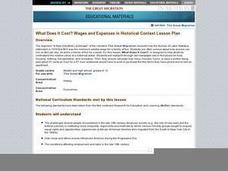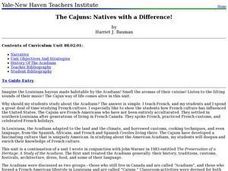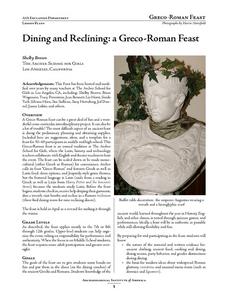Curated OER
Clothesline Sleuth
Students explore the make up of fabrics. In this agriculture lesson, students examine the cotton and wool crops of the United States and discover how fabrics are created.
Curated OER
ADULT ESOL LESSON PLANS--Obtaining Employment
Students examine all the techniques required to look good for an interview in order to make a good impression and build up of your confidence level to do well on the job. They soon realize that dressing the part is vital to landing a job...
Curated OER
ARTSEDGE: Creating Costumes
Young designers examine famous monarch portraits and costume books, create a design for the emperor, examine fabric samples and choose a type and color for their costume. They sketch the costume and present it in a class fashion show.
Curated OER
Working Together to Solve a Problem
Students create a food and clothing drive at their school. In this philanthropy lesson, students listen to the story Selavi, That is Life, to help them understand homelessness. Then, students brainstorm ways to implement a plan to...
Curated OER
Homeless Fact Sheet
Students investigate the reasons why people are homeless and how they can help. In this community lesson, students identify what it means to be "homeless," and why it is important to help them now. Students create a food...
Curated OER
Fahrenheit Follies
Second graders analyze the effects of sunlight on a glass of water by using the thermometer to measure its temperature. They predict and measure the difference between water outside in the sun and shade and inside. They role-play a game...
Curated OER
What Does It Cost? Wages and Expenses in Historical Context
Students research the relative value of a historical dollar. They use old newspapers to find costs for food, housing, clothing, and transportation and then calculate the number of hours a worker would need to be employed to live...
Curated OER
Math Combinations
Students examine how to use lists, tables, and tree diagrams to solve math combinations. They create various combinations of outfits using clothing manipulatives, watch an episode of the PBS series Cyberchase, and play an interactive...
Curated OER
The Cajuns: Natives with a Difference!
Students examine the immigrant experiences of various culture groups. Using this information, they work together to compare and contrast these experiences with those of the Cajuns. As a class, they define ethnic group and research the...
Curated OER
Figure Analysis
Students identify the importance of the Principles and Elements of design through self-analysis and sketching clothing appropriate for their body type. They write the actual color name on a line of the included sheet, then describe why...
Curated OER
Life Systems - Plant Growth
3rd graders will participate in a variety of tasks which help them to understand the basic concepts of plant growth. Research and reporting skills are developed as they gather information from various sources related to the use of plants...
Curated OER
Dining and Reclining: a Greco-Roman Feast
Students acquire and discover what it was like to be the ancient Greeks and Romans at a feast. They identify the informal and formal Greek and Roman clothing styles,and basic information about ancient make-up and
hairstyles and the...
Curated OER
The Ancient Mediterranean: Trade, Contact, and Cultural Diffusion
Ninth graders begin the lesson by being introduced to the basic terms of economics. In groups, they discover how they are affected by trade because of the clothes they wear and foods they eat. Using primary sources, they examine the...
Curated OER
Similar or Different?
In this similar or different worksheet, students view two pictures of women from different times in history. Students determine how their clothes are similar and different and write down their findings.
Curated OER
Making a Mini Worm Habitat
Third graders create an earthworm habitat. In this worms lesson, 3rd graders construct a KWL chart about earthworms and research their habitat. Students create a mini habitat for their earthworms by using gravel, sand, cloth, and soil.
Curated OER
What Do Soils Have to Do With Me?
In this identifying ways we use soils every day activity, students investigate their houses, home environment, clothing labels, and foods to see what was made from things grown in soils. Students write 5 short answers.
Curated OER
American Made
Young scholars view the Film American Made and view the experiences of a Sikh family in the Western part of America. In this life in America instructional activity, students explore the life of Americans who might by looks be...
Curated OER
Claycrete Calaveras - Dia de los Muertos
Students create skeletons to celebrate the Day of the Dead. In this visual arts lesson, students explore the importance of the Day of the Dead celebrations in the Mexican culture. They create skeletons and decorate them with paint,...
Curated OER
Triangles in My Life
Tenth graders investigate where in the real world triangles are used. In this geometry lesson, 10th graders write an essay describing where in their lives triangles are used. They can use food, buildings, clothing or anything triangular...
Curated OER
Introductory Lesson: Greece
Students get a taste of Greek culture. In this Greece lesson, students participate in activities that require them to study the religion, music, food, clothing, and history of Greece.
Curated OER
Tobacco
Students write paragraphs about the message of an advertisement ad they see in magazines and their intended audience. In this advertisements lesson plan, students look at tobacco, clothing, hair products, and more.
Curated OER
Matter
Second graders read the book The Mitten and discuss the changing weather and appropriate clothes to wear in certain kinds of weather. In this weather lesson plan, 2nd graders also have a literature, writing, and math component to the...
Curated OER
Color Adjectives
Here is a color adjectives activity. Learners select an article adjective, a color, and a clothing word. They write short descriptions using the three components. Interesting activity!
Curated OER
Skin and Sports
The topic is protecting our own protective covering: the skin. In particular, the information deals with sweating as a means of temperature regulation and the need to wear clothing appropriate for allowing the process to occur. Learners...
Other popular searches
- Winter Clothing
- Clothing Designers
- Appropriate Clothing
- Renaissance Clothing
- Clothing Vocabulary
- Traditional African Clothing
- French Clothing
- Clothing Manufacturing
- 18th Century Clothing
- Clothing Choices
- Clothing of Ancient Cultures
- Clothing Change

























